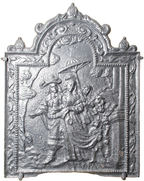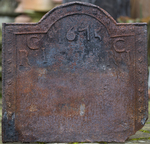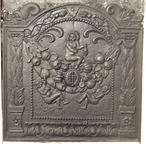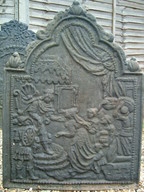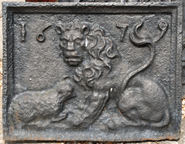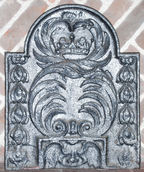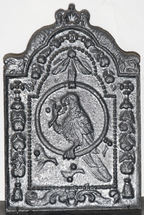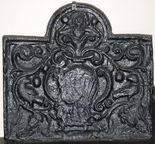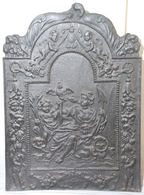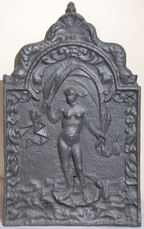-
544
Description: Arched rectangular central panel with bead on fillet edging, pictorial representation of a man and woman walking, behind the woman a child holds her train and a young person carries a parasol; from behind a column on the right, a horse's head is visible, a tree stands to the left; arched rectabular border with cavetto-moulded edging; top centre, scallop shell from which descend undulating leaf fronds; on top, a pomegranate to which ascends a serpent on each side, with a further pomegranate on each shoulder of the plate.
Notes: The pictorial scene is based on an engraving c.1642 of Friedrich Wilhelm, Elector of Brandenburg, and his wife, Luise Henriette of Oranje-Nassau, by Mathias Czwiczek; one of series of firebacks depicting allegories of the four continents. Mitford collection, Petworth House.
Copies of this fireback are known.
Inscription: EVROPA
- Decoration tags:
- 'Dutch' (shape)
- cavetto (edging)
- whole carved pattern
- pictorial
- humans
Manufactured: in the mid- to late-17th century in the Siegerland area of Germany.
Current location: Petworth House, Petworth, West Sussex, England.
Museum number: NT/PET/M/99 (part of the National Trust museum group)
- Attached to series:
- 'Dutch' Miscellaneous Firebacks
- 'Dutch' Continents firebacks
-
978
Description: Arched rectangular shape; twisted rope edging with inaccurately parallel arched rectangular fillet inside, enclosing repeated small fleur-de-lys stamps along sides and top; initials in triad in each of the internal top corners; date in arch.
Notes: The initials probably relate to a couple whose surname begins with C, the husband's forename initial being R and the wife's I (or J).
Inscription: RCI/ 1675 / RCI
- Decoration tags:
- rectangular with round arch (shape)
- rope (edging)
- simple stamps
- carved stamps
- individual letters
- individual numbers
- heraldic
- text
Manufactured: in 1675 in England.
Current location: not known.
- Attached to series:
- Miscellaneous stamp firebacks
-
591
Description: Arched rectangular shaped; cavetto-moulded edging; on each side a column of large overlapping leaves above a pedestal with a single rose; issuing from the top of each column two ribbons, in figure-of-eight with grenade terminals, fly across the arch; within an arched central panel with bead edging three naked children disport about a swag of fruit, with a central pomegranate, suspended from the top of each column; one figure sits on the top, facing right, the other two hang symmetrically from below; along the base is a line of acanthus leaves; on top a sea serpent is curled on each end.
Notes: The design may have been inspired by the paintings of Jan Pauwel Gillemans the younger (1651-1704); he may have worked in London in 1675-8. Another version (no. 575), probably by the same pattern maker, has a central finial on top and different proportioned fruit and figures. Copies of this fireback were advertised in Bratt Colbran Ltd.'s (London) catalogue in the early-20th century.
Copies of this fireback are known.
- Decoration tags:
- 'Dutch' (shape)
- cavetto (edging)
- whole carved pattern
- pictorial
- mythological
- humans
- plants
Manufactured: in the mid- to late-17th century in England.
Current location: Ham House, Richmond, Surrey, England.
Museum number: 1140116 (part of the National Trust museum group)
- Attached to series:
- Carolean 'Dutch' series
-
610
Description: Arched rectangular central panel with additional arch above; bead and fillet edging; pictorial scene of Solomon, rising from a scallop-backed, canopied throne, greeting the Queen of Sheba, with other figures in attendance; identical shaped border with fillet edging; on top, a cockle shell with a descending serpent on each side, and a cockle shell on each shoulder of the plate.
Notes: Several contemporary paintings are of similar scenes; this design may have been derived from one of two by Erasmus Quellinus.
Copies of this fireback are known.
Manufactured: in the mid- to late-17th century in the Siegerland area of Germany.
Current location: Mark Ripley Forge & Fireplaces, Northbridge Street, Robertsbridge, East Sussex, England.
-
624
Description: Rectangular; cavetto edging all round; seated lion on right, its tail rising above its back and its head turned to face the viewer; a seated sheep on the left; date split across top.
Notes: Intended to represent the saying, ‘The lion shall lie down with the lamb’, a popular misquotation of Isaiah 11: 6.
Copies of this fireback are known.
Inscription: 1679
- Decoration tags:
- rectangular (shape)
- cavetto (edging)
- whole carved pattern
- individual numbers
- pictorial
- biblical
- text
- animals
Manufactured: in 1679 in the Weald area of England.
Current location: Mark Ripley Forge & Fireplaces, Northbridge Street, Robertsbridge, East Sussex, England.
- Attached to series:
- Small cavetto series
- Old Testament & Apocrypha firebacks
-
646
Description: Arched rectangular shape; fillet edging; bell-flower column repeated on each side; at bottom, central rectangular panel, fillet edged, enclosing outstretched wings; above, intertwined leaves in figure-of-eight, enclosing a crown at the top.
Notes: This fireback incorporates features of the ‘Dutch’ style but within an English form.
- Decoration tags:
- rectangular with round arch (shape)
- fillet (edging)
- whole carved pattern
- heraldic
- plants
Manufactured: in the mid- to late-17th century in England.
Current location: Eastgate House, High Street, Rochester, Kent, England.
Museum number: A3484 (part of the Rochester Guildhall Museum museum group)
- Attached to series:
- Miscellaneous pattern firebacks
-
648
Description: Arched rectangular central panel with arch and bead-on-fillet edging; pictorial representation of a popinjay, or parrot, perched on a ring suspended by a ribbon from a bow, the bird is clutching an olive twig, other sprigs are below; arched rectangular border with arch and fillet edging; mirrored festoons of flowers and fruit suspended from roses, scrolled foliage at the bottom; on top, central scallop shell between descending dolphins.
Notes: The parrot on the ring perch is a popular design on Dutch firebacks.
Copies of this fireback are known.
Manufactured: in the mid- to late-17th century in the Siegerland area of Germany.
Current location: Eastgate House, High Street, Rochester, Kent, England.
Museum number: A3491 (part of the Rochester Guildhall Museum museum group)
- Attached to series:
- 'Dutch' Bird on perch firebacks
- 'Dutch' Miscellaneous Firebacks
-
653
Description: Arched rectangular shape; cavetto-moulded edging; central, two handled, fluted vase with swirled, fruited vines issuing from the neck, and a bird on each side perched within the vines; out of the neck, a naïve human figure with arms outstretched, grasping vines on each side.
Notes: The figure emerging from the vase has a symbolism which has yet to be explained.
Copies of this fireback are known.
- Decoration tags:
- rectangular with round arch (shape)
- cavetto (edging)
- whole carved pattern
- pictorial
- plants
- objects
Manufactured: in the mid- to late-17th century in the Weald area of England.
Current location: Eastgate House, High Street, Rochester, Kent, England.
Museum number: A3496 (part of the Rochester Guildhall Museum museum group)
- Attached to series:
- Gadrooned vase firebacks
-
674
Description: Arched rectangular shaped central panel with bead edging; pictorial scene of a seated female figure resting against a hurdle, holding an anchor, a child on each side of her, the one on the left standing clutching corn stalks, the one on the right sitting also holding the anchor and a circular object; a bird sits on a post; arched rectangular border with fillet edging; at the top of the arch a cartouche from which are suspended two ribbons, each held by a putto, from which cascade flowers and fruit, each lower part hung from a ring; two putti are on each side, one climbing on the suspended ribbon, the other at its foot; at the bottom, an empty cartouche between two clusters of flowers each suspended on a ribbon tied to a scroll; on top, two descending cornucopiae.
Notes: The figure represents Hope. The theft in 1699 from a Thames-side warehouse of several firebacks, including '3 of Hope with an Anchor' may refer to this type (Post Boy 11-14 Nov. 1699).
Copies of this fireback are known.
- Decoration tags:
- 'Dutch' (shape)
- fillet (edging)
- whole carved pattern
- pictorial
- allegorical
- humans
- objects
Manufactured: in the mid- to late-17th century in the Siegerland area of Germany.
Current location: Saffron Walden Museum, Saffron Walden, Essex, England.
Museum number: 1889-9 (part of the Saffron Walden Museum museum group)
- Attached to series:
- 'Dutch' HIS series
- Hope firebacks
-
678
Description: Arched rectangular main panel; fillet edging; nude female figure standing on shield and holding a wind-blown sheet, upon a ground; suspended floral garlands with swirled foliage above; on top, a scallop shell between two symmetrical sea serpents
Notes: The figure is of Fortune. The theft in 1699 from a Thames-side warehouse of several firebacks, including '5 iron Chimney-Backs cast in the figure of Fortune standing naked on a Conchus in the Sea' may refer to this type (Post Boy 11-14 Nov. 1699).
- Decoration tags:
- 'Dutch' (shape)
- fillet (edging)
- whole carved pattern
- pictorial
- allegorical
- humans
Manufactured: in the mid- to late-17th century possibly in the Siegerland area of Germany.
Current location: Saffron Walden Museum, Saffron Walden, Essex, England.
Museum number: 1901-39 (part of the Saffron Walden Museum museum group)
- Attached to series:
- 'Dutch' Miscellaneous Firebacks
